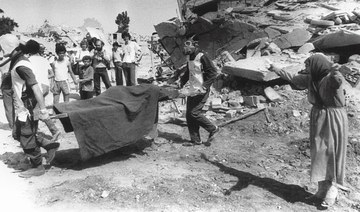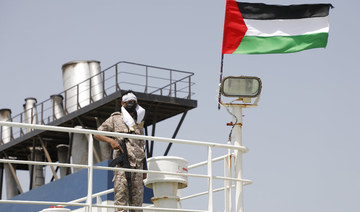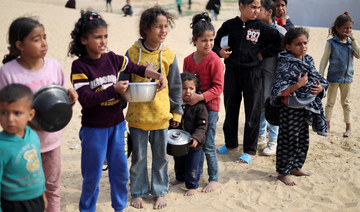BEIRUT: Forty years after Christian militiamen massacred Palestinian refugees and Lebanese nationals in the country’s Sabra and Shatila refugee camps, the horrors of the tragedy remain seared into survivors’ memories.
Najib Al-Khatib, whose father and 10 other family members were killed in the massacre, still remembers the stench of corpses.
It “lingered for more than five or six months. A horrible smell,” the 52-year-old Lebanese survivor said.
“They would spray chemicals every day, but the smell stayed,” he told AFP from the Sabra camp for Palestinian refugees, where he lives with his family.
From September 16 to 18, 1982, Christian militiamen allied with Israel massacred between 800 and 2,000 Palestinians in the Sabra and Shatila camps on Beirut’s outskirts. They also murdered at least 100 Lebanese and some Syrians.
Israeli troops, who had invaded in June that year as Lebanon’s civil war raged, sealed off the camp while the militiamen went on their killing spree, targeting unarmed civilians.
Camp residents have been readying to mark the massacre’s 40th anniversary on Friday.
“Until today, the smell is still in our heads — the smell of the dead,” Khatib said.
Khatib walked down an alleyway in the impoverished Sabra camp where he witnessed the atrocities four decades earlier.
“This is my grandmother’s house. During the massacre, it was full” of dead bodies, he recalled. “They were piled up here. Horses and corpses, all on top of each other.”
“This area was full of people they killed,” he said.
One of Khatib’s most harrowing memories was finding his father’s body at the door of his house.
“He was shot in his legs,” he said. “They had hit him in the head with a hatchet.”
Despite global outcry, no one has ever been arrested or put on trial for the massacre.
It came just days after the assassination of Lebanese president-elect Bashir Gemayel — seen as a hero by many Lebanese Christians but hated by many in Lebanon for his cooperation with Israel.
In Israel, an inquiry found a number of officials, including then defense minister Ariel Sharon, were indirectly responsible.
It laid blame on Elie Hobeika, intelligence chief of the Lebanese Forces — a right-wing Christian militia — for the killings.
The LF, then allied to Israel, has maintained silence, never responding to the accusations.
A group of survivors tried to launch a lawsuit in Belgium against Sharon, but the court threw out the case in September 2003.
Umm Abbas, a Lebanese resident of Sabra who witnessed the massacre, recalled the “unimaginable scenes” that have gone unpunished.
“What did I see? A pregnant woman who had her baby ripped out of her stomach, they cut her in two,” the 75-year-old said.
Another woman, “she was also pregnant, they ripped the baby from her stomach too,” she said.
Sitting in an alley, Umm Abbas recalled bulldozers scooping up dead bodies and dumping them on top of each other.
“They put them all in a deep hole, I saw them,” she said.
Survivors mark the massacre every year, some visiting the graveyard in Sabra where many of the victims were buried.
A simple stone memorial pays tribute to the “martyrs” of the massacre.
Palestinian Amer Okkar prayed at the site, where the makeshift graves still bear no tombstones.
“We found everyone slaughtered on the ground, in all the alleyways and along this street,” the 59-year-old former militant remembered.
“We found pills and machetes and hashish and drugs on the ground — no one could kill like that unless they were on drugs,” he said.
40 years on, survivors recall horror of Lebanon’s Sabra and Shatila massacre
https://arab.news/bkb2p
40 years on, survivors recall horror of Lebanon’s Sabra and Shatila massacre

- In September 1982, Christian militiamen allied with Israel massacred between 800 and 2,000 Palestinians in the Sabra and Shatila camps on Beirut’s outskirts
- Camp residents have been readying to mark the massacre’s 40th anniversary on Friday
Iran to hold presidential election on June 28: state media

- The election calendar was approved at the meeting of the heads of the judiciary, government, and parliament
TEHRAN: Iran announced Monday it will hold presidential elections on June 28, state media reported, following the death of President Ebrahim Raisi and his entourage in a helicopter crash.
“The election calendar was approved at the meeting of the heads of the judiciary, government, and parliament,” state television said.
“According to the initial agreement of the Guardian Council, it was decided that the 14th presidential election will be held on June 28.”
US says Houthis fired ballistic missile over Gulf of Aden

- “This continued malign and reckless behavior by the Iranian-backed Houthis threatens regional stability and endangers the lives of mariners,” CENTCOM said
- The Houthis did not claim credit for any fresh assaults on Monday, but they regularly do days later
AL-MUKALLA: Yemen’s Houthi militia launched a ballistic missile over the Gulf of Aden on Sunday, the US military said.
This comes as the Houthis intensified attacks on Yemeni government soldiers around the country.
The US military said in a statement on Monday morning Yemen time that at about 9:35 p.m. (Sanaa time) on Sunday, the Houthis launched one anti-ship ballistic missile from Yemen over the Gulf of Aden, but neither the US-led coalition nor international commercial ships reported being hit by the missile.
“This continued malign and reckless behavior by the Iranian-backed Houthis threatens regional stability and endangers the lives of mariners across the Red Sea and Gulf of Aden,” CENTCOM said.
The Houthis did not claim credit for any fresh assaults on Monday, but they regularly do days later.
The Houthis’ newest missile launch is part of an escalation of missile and drone strikes against commercial and navy ships in international seas near Yemen as well as in the Indian Ocean, which the Houthis claim are in support of Palestine.
The Houthis attacked dozens of ships with hundreds of ballistic missiles, drones and drone boats during their campaign against ships, which started in November.
They also took control of one commercial ship and destroyed another.
The US military said on Saturday that a Greek-owned and operated oil tanker heading toward China in the Red Sea, flying the flag of Panama, barely avoided being struck by a ballistic missile launched by the Houthis.
Meanwhile, four Yemeni government troops were killed on Monday while battling the Houthis in the province of Taiz, bringing the total number of soldiers killed in Houthi attacks to 11 in less than a week.
Local media said that the government’s Nation’s Shield Forces engaged in heavy fighting with the Houthis in the Hayfan area, on the border between Taiz and Lahj provinces, that left four of its soldiers dead.
On Saturday, a soldier from the same Yemeni military unit was killed and another injured while defending their position in Haydan against a Houthi onslaught.
Six more Yemeni soldiers from the government’s Giants Brigades were killed on Saturday in fighting with the Houthis in the Al-Abadia region of Marib’s central province.
On Monday, the Houthis held a military burial procession in Sanaa for two of their troops killed while battling with Yemeni government forces.
The Houthis have organized similar funerals for hundreds of fighters who have died on the front lines ever since the UN-brokered ceasefire came into effect in April 2022.
At the same time, official media said that Yemen’s Defense Minister Lt. Gen. Mohsen Al-Daeri met the UN Yemen envoy’s military adviser, General Antony Hayward, in Aden on Sunday to discuss Houthi attacks on government troops across the country, peace efforts to end the war, and the smuggling of Iranian weapons to the Houthis.
Al-Daeri said that the Houthis had breached agreements with the Yemeni government and would continue to pose a danger to international maritime lines as long as they controlled Yemeni territory on the Red Sea.
He also accused Iran of continuing to supply weapons and military officers to the Houthis through direct journeys from Iran’s Bandar Abbas port to the Houthi-controlled Hodeidah port.
On Monday, UN experts, including Nazila Ghanea, special rapporteur on freedom of religion or belief, urged the Houthis to release five members of the Bahai religious minority and to stop persecuting religious minorities in regions they control.
“We urge the de facto authorities to release these five individuals immediately and refrain from any further action that may jeopardize their physical and psychological integrity,” the experts said.
Armed Houthis abducted 17 Bahais, including five women, after bursting into a meeting in Sanaa a year ago, and they have refused to release them despite local and international requests.
According to the UN experts, the Houthis released 12 Bahais under “very strict conditions” after signing a written pledge not to communicate with other sect members, avoid religious activities and not leave cities without permission, and that the Houthis continue to hold five who are at risk of mistreatment by their captors.
“We are concerned that they continue to be at serious risk of torture and other human rights violations, including acts tantamount to enforced disappearance,” the UN experts said.
Egypt mourns death of Iran’s president

- The Egyptian president expressed Egypt’s solidarity with the leadership and people of Iran during this tragic time
CAIRO: Egypt mourned the deaths of Iran’s President Ebrahim Raisi and Foreign Minister Hossein Amir-Abdollahian.
Egypt’s presidency said in a statement: “It is with deep grief and sorrow that the Arab Republic of Egypt mourns the death of the President of the Islamic Republic of Iran, Ebrahim Raisi, Iran’s Minister of Foreign Affairs Hossein Amir-Abdollahian and their escorts on Sunday in a tragic crash.
“President Abdel Fattah El-Sisi extends his sincere condolences to the people of Iran, asking Allah to envelop President Raisi and the deceased with his mercy and grant solace and comfort to their families.”
The Egyptian president expressed Egypt’s solidarity with the leadership and people of Iran during this tragic time.
Meanwhile, Egypt’s Minister of Foreign Affairs Sameh Shoukry extended his condolences to the Iranian government and people over the deaths of Raisi and Amir-Abdollahian, according to ministry spokesperson Ahmed Abu Zeid.
A helicopter carrying Raisi, Amir-Abdollahian, and several other officials crashed in mountainous terrain in the country’s northwest on Sunday. On Monday, Tehran announced the deaths of Raisi, Amir-Abdollahian, and their accompanying delegation in the crash.
Israel calls ICC prosecutor’s bid for PM arrest warrant a ‘historical disgrace’

- Katz denounced the move as a “scandalous decision” that amounted to “a frontal attack... on the victims of October 7“
- The minister added that Israel would establish a special committee to fight the ICC prosecutor’s efforts to secure a warrant
JERUSALEM: Israel on Monday slammed as a “historical disgrace” an application by the prosecutor of the International Criminal Court for an arrest warrant for Prime Minister Benjamin Netanyahu.
The prosecutor, Karim Khan, applied for arrest warrants against Netanyahu and Defense Minister Yoav Gallant as well as top Hamas leaders on suspicion of war crimes and crimes against humanity.
Foreign Minister Israel Katz said that Khan “in the same breath mentions the Prime Minister and the Minister of Defense of the State of Israel alongside the abominable Nazi monsters of Hamas — a historical disgrace that will be remembered forever.”
The prosecutor said he was seeking warrants against Netanyahu and Gallant for crimes including “wilful killing,” “extermination and/or murder” and “starvation.”
Katz denounced the move as a “scandalous decision” that amounted to “a frontal attack... on the victims of October 7” when Hamas launched their attack on Israel, sparking the Gaza war.
The minister added that Israel would establish a special committee to fight the ICC prosecutor’s efforts to secure a warrant, and also embark on a diplomatic push against it.
Katz said he planned to “speak with foreign ministers in leading countries of the world so that they oppose the prosecutor’s decision and announce that, even if orders are issued, they do not intend to enforce them on the leaders of the State of Israel.”
35,562 Palestinians killed in Gaza offensive since Oct. 7 — health ministry

- 106 Palestinians were killed and 176 injured in the past 24 hours
DUBAI: More than 35,562 Palestinians have been killed and 79,652 injured in the Israeli military offensive on Gaza since Oct. 7, the Gaza health ministry said in a statement on Monday.
One hundred and six Palestinians were killed and 176 injured in the past 24 hours, the ministry added.






















